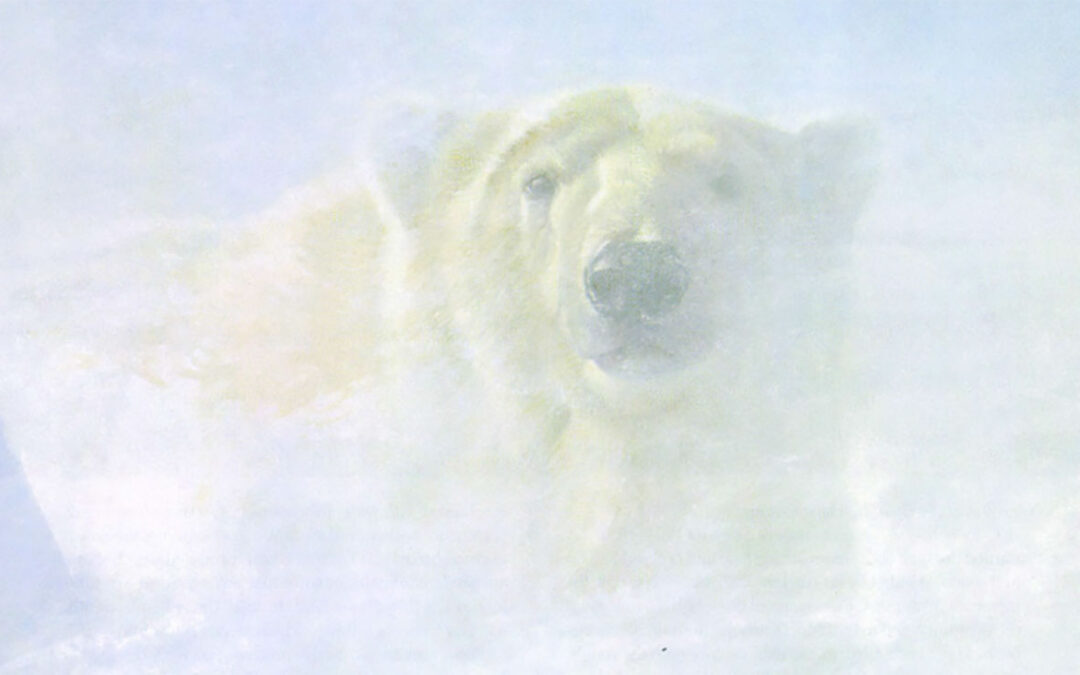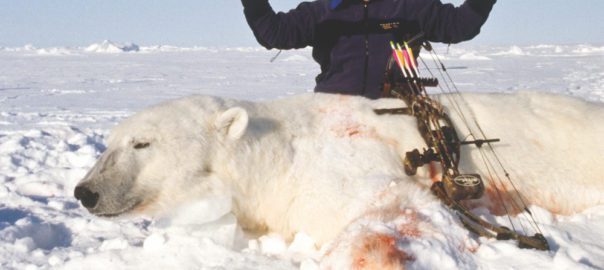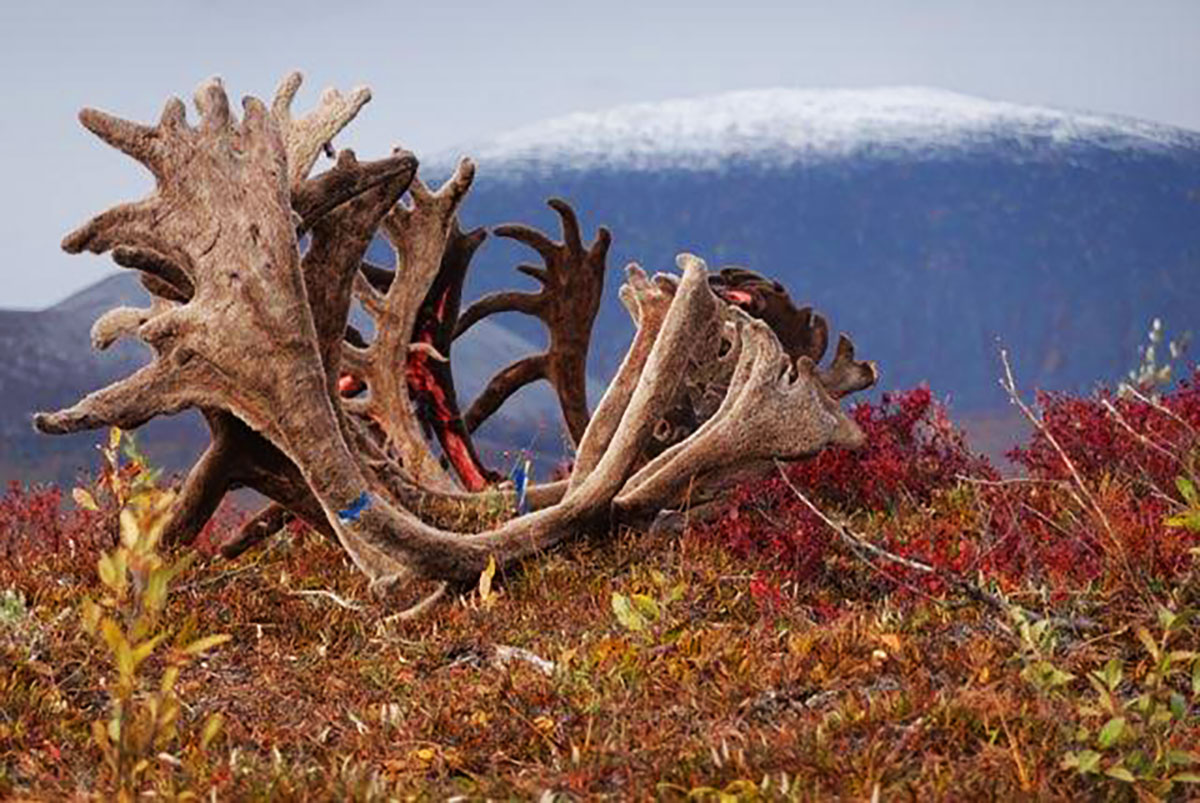The scent of an unknown flesh grew stronger and stronger in the bear’s nose as he ambled towards its source. He, too, was looking for fresh meat.
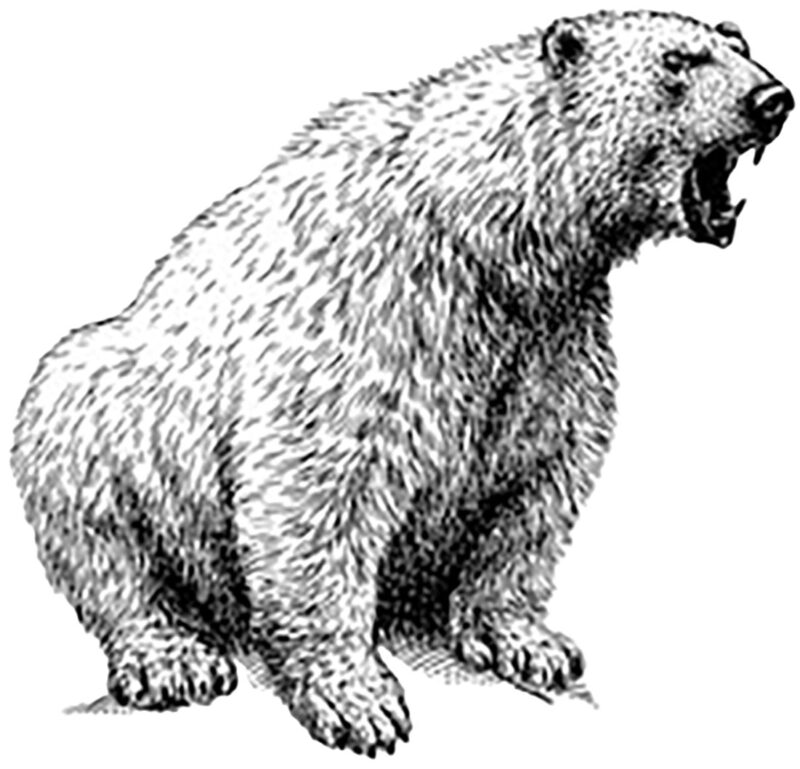 Sergeant Long dutifully studied the distance between ice flows, completely unaware that he was being hunted. Oblivious to the danger stalking closer, Long continued measuring tide levels, happy for the diversion from the monotonous existence of life aboard a trapped ship.
Sergeant Long dutifully studied the distance between ice flows, completely unaware that he was being hunted. Oblivious to the danger stalking closer, Long continued measuring tide levels, happy for the diversion from the monotonous existence of life aboard a trapped ship.
For several months in 1903, the America lay exposed and dying, the victim of crushing pack ice on the western coast of Crown Prince Rudolf Land. Her attempt to be the first to reach the North Pole from Franz Josef Land was now a forgotten memory in the swirling winds of the Arctic. Isolation, sunless days that plummeted to 62 degrees below zero and no certainty of rescue left most members of the Fiala-Ziegler Polar Expedition teetering on the edge of despair or madness. In an effort to keep their wits about them, the men did what they could to stay on some sort of schedule. Sergeant Long was no exception.
Roughly a thousand yards away, expedition leader Anthony Fiala scanned the frozen bay below the remains of the America for signs of game. Polar bears and several species of seal were often sighted and their flesh would offer a welcome change come mealtime. Although fully stocked with enough provisions to last over two years, fresh meat was always a scarce commodity aboard ship. Armed with an 8mm Mannlicher carbine, Fiala hoped to change that.
Surveying the jagged “rough ice” beyond the bay, Fiala spotted a huge bear scrambling through the uneven maze of frozen peaks and deep cuts toward Sergeant Long. Fiala grabbed another clip of ammunition and raced to the unsuspecting Sergeant, the bone dry, minus 45-degree air burning his mouth and nostrils and scraping his lungs with the power of a sandblaster. Screams of warning were wiped aside by the howling wind, and all efforts to get the Sergeant’s attention went unnoticed.
The scent of an unknown flesh grew stronger and stronger in the bear’s nose as he ambled towards its source. He, too, was looking for fresh meat. The bear couldn’t identify the creature that stood beyond the jagged ice, but he could tell from its smell that it was edible. Based on the way it failed to notice its surroundings, it would be an easy kill as well.
Just as the bear reached the edge of the frozen bay, another of the creatures appeared. Curious, the bear slowed his descent to the ice below and waited, watching intently.
Once within shouting distance of Sergeant Long, Fiala warned the man of the approaching bear and ordered him back to the ship. Winded by his run but determined to supply the men with fresh meat, Fiala scanned the rough ice for signs of the bear but failed to spot him. Knowing the animal was close by, Fiala devised a plan; rather than venture onto the rough icepack in search of the bear, he’d let the bear come to him.
Fiala lay upon the ice so he would resemble a basking seal. He kicked his feet back in forth to imitate a tail and bobbed his head up and down as if periodically waking from his nap to search for danger. To make sure he wasn’t ambushed from behind, Fiala “flopped around every once in a while.”
As the searing cold of the ice crept into his bones, Fiala grew more and more anxious. Years of arctic exploration had given him great respect for polar bears. He knew of their acute sense of smell, of their uncompromising patience when hunting and how their white pelage allowed them to become almost invisible when stalking game. He also knew that one was less than 200 yards away, watching his every move and waiting for the perfect moment to strike.
Measuring over 10 feet in length and weighing upwards of 1,700 pounds, the polar bear is the largest land predator on the planet. Despite their size, they are extremely fast, able to cover short distances at up to 35 mph. This surefooted speed is achieved with wide, fur-covered paws that offer superb traction as well as insulation. When swimming, the paws become broad paddles that when combined with hollow, air-filled guard hairs, ensures that polar bears are as at home in water as they are on land. Indeed, the animal’s scientific name is Ursus maritimus, which means “maritime bear.”
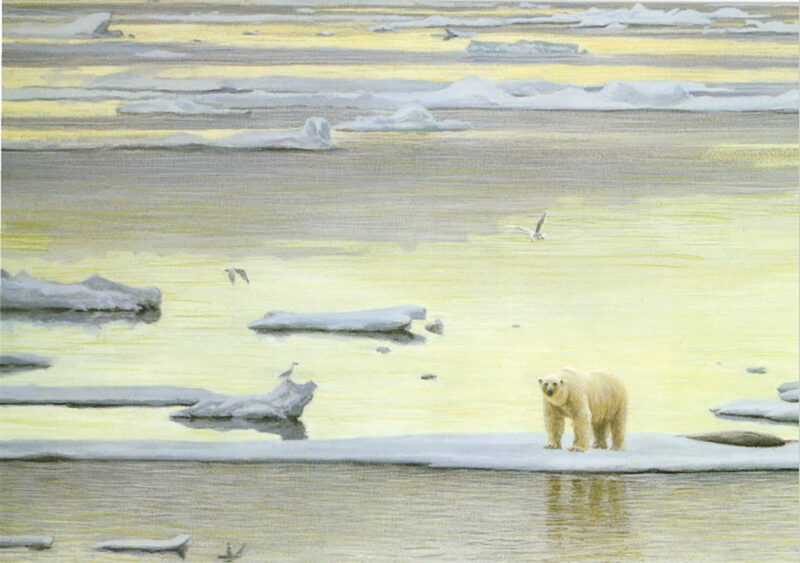
Polar bears are formidable predators, perfectly designed for hunting in some of the most inhospitable places on earth. Sharp claws and long canine teeth at the end of an elongated neck aid in grasping and holding prey. Their powerful jaws are designed to kill small seals with a single crushing bite to the skull. Sheer muscle power and stealth allow them to kill walruses and even beluga whales, prey that are more than twice their size.
These observations must have railed through Fiala’s mind as he turned to see an enormous piece of what looked like ice buckle and rise toward the sky. Slowly the skyward edge of the slab began to descend, as if it were nothing more than a child’s see-saw teetering on some unseen midpoint. The white apparition continued toward him until, at the edge of the glacier plank, it sprang forward onto the sheet of ice where Fiala lay.
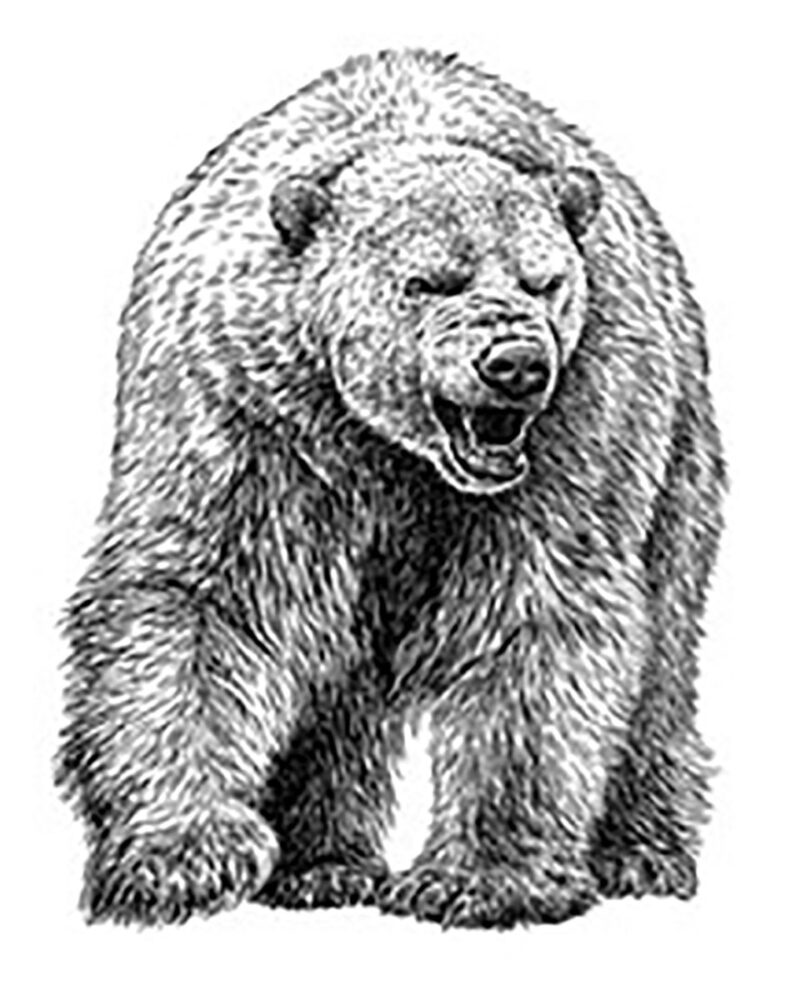 Fiala held his position and tried to remain calm. He was entranced at the set of black eyes glaring with intensity in his direction. Taking full advantage of his prey’s hypnotic lapse, the monstrous bear lunged forward, the ice beneath his thundering gait booming with percussion blasts. Less than 75 yards separated man and beast when Fiala jumped up, leveled his rifle and quickly found the the bear’s skull in his rifle sight. Flushed with adrenaline, Fiala pulled the trigger, confident he could drop the bear in its tracks. Instead of the rifle’s report, Fiala was horrified to hear the faint tap of the firing pin against the cartridge.
Fiala held his position and tried to remain calm. He was entranced at the set of black eyes glaring with intensity in his direction. Taking full advantage of his prey’s hypnotic lapse, the monstrous bear lunged forward, the ice beneath his thundering gait booming with percussion blasts. Less than 75 yards separated man and beast when Fiala jumped up, leveled his rifle and quickly found the the bear’s skull in his rifle sight. Flushed with adrenaline, Fiala pulled the trigger, confident he could drop the bear in its tracks. Instead of the rifle’s report, Fiala was horrified to hear the faint tap of the firing pin against the cartridge.
Fiala’s rush of adrenaline boiled to panic. Despite the temperature, sweat pooled on his scalp and ran down his face. He considered his knife, but at the sight of the juggernaut barreling toward him thought the better of it. Knowing his fate depended on less than a second’s actions, Fiala stepped forward and screamed at the top of his lungs. The bear immediately halted, startled and confused.
Taking full advantage of his momentary reprieve, Fiala nervously inspected his rifle while trying to keep one eye on the bear. Thinking the bolt was frozen, he quickly began rubbing his hands back and forth over the mechanism to warm it. Bullet after bullet sprung free, spinning through the air before plinking on the ice as Fiala inadvertently ran the entire magazine through his rile. No longer stunned by Fiala’s actions, the bear tilted his head and began “hissing like an enormous snake.”
Fiala matched the bear’s hisses with more screaming and cussing as he frantically searched for another magazine for his now empty rifle. Meanwhile, the bears linked forward, sizing up his prey for attack. Fiala slammed home a new clip of ammunition, leveled his rifle at the bear’s form and pulled the trigger.
Nothing.
Another misfire.
Fiala quickly jacked another round into the chamber and fired only to hear the soft tap of another misfire. Preparing to strike, the bear bulldozed ahead at full speed. With less than 15 feet between him and white death, Fiala tried his rifle one last time. The sudden explosion caught the bear fully in the face, flipping him head-over-heels. Fiala bolted in another round and fired at the fleeing bear. The second shot caught the animal in the hindquarters, dropping him as he reached the rough ice. A third shot to the brain finished the beast and allowed Fiala the chance to breathe once more.
Minutes later, while looking over the huge carcass, Fiala made a frightening discovery: his first shot had somehow missed. Only a face full of powder and the power behind it had flipped the bear over and allowed Fiala to live.
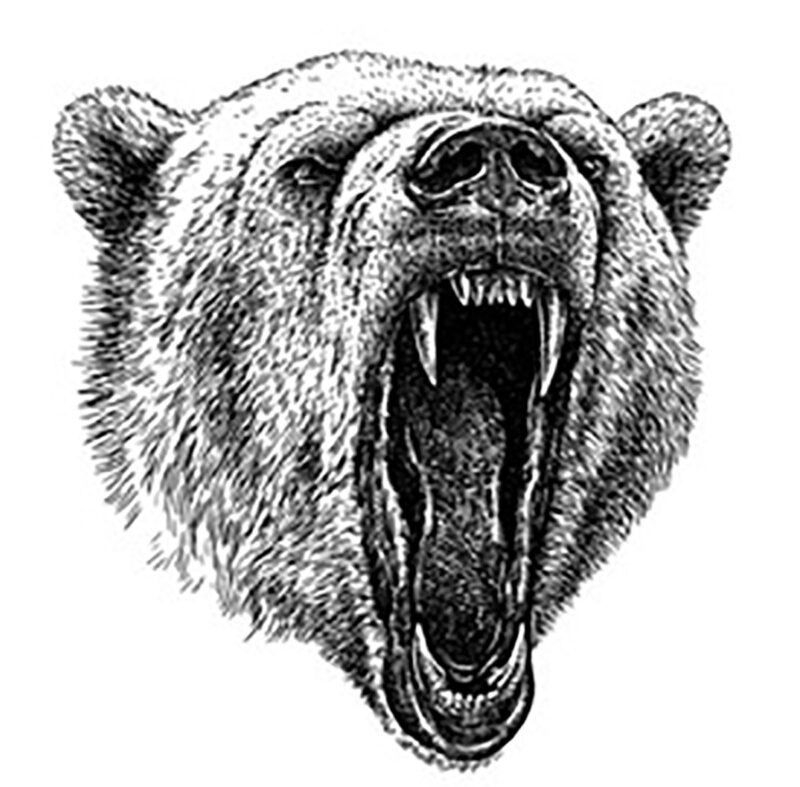 That night as the crew of the America processed the bear, Fiala had the opportunity to speak with the man in charge of the expedition’s weapons. The two men concluded that the misfires were caused by a coating of oil on the firing pin.
That night as the crew of the America processed the bear, Fiala had the opportunity to speak with the man in charge of the expedition’s weapons. The two men concluded that the misfires were caused by a coating of oil on the firing pin.
As for the fate of America’s crew, they would spend almost two years trapped upon the Arctic ice before they were rescued by another ship.
 Finishing the final book in the iconic Legends series, Legendary Hunters and Explorers is the epitome of Sir John Seerey-Lester’s spirit. Filled with over 120 paintings and 45 descriptive chapters, the new 200-page book relives the compelling stories of 25 acclaimed hunters and explorers. Buy Now
Finishing the final book in the iconic Legends series, Legendary Hunters and Explorers is the epitome of Sir John Seerey-Lester’s spirit. Filled with over 120 paintings and 45 descriptive chapters, the new 200-page book relives the compelling stories of 25 acclaimed hunters and explorers. Buy Now
